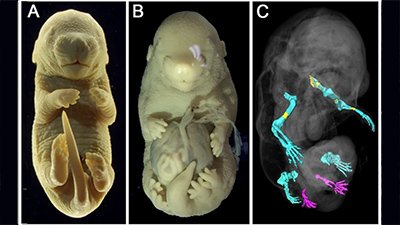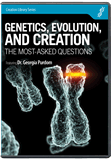Increasing Organisms' Genetic Information
PhysOrg: “Generational Research on Drosophila Sheds Light on Genetic Mechanism of Evolution” Creationists often critique evolutionary theory as lacking a plausible mechanism for increasing organisms’ genetic information. But will University of California–Irvine research “shed light” in the void?
A team of evolutionary biologists at the school has been busy breeding fruit flies—six hundred generations worth of Drosophila melanogaster, who have had a combined life span roughly equivalent to 12,000 human years since the lab began breeding them in 1991. The goal? To resolve a debate over the genetic basis for “evolution” that’s been raging for years.
Respected scientists have lined up on both sides of the debate over whether the process is the same in sexual organisms.
The question is whether “evolution” in sexual organisms is usually the result of a mutation in a single gene being passed to offspring, or instead the result of lesser mutations in multiple parent genes that together contribute to offspring evolution. Although the former occurs in asexual organisms, respected scientists have lined up on both sides of the debate over whether the process is the same in sexual organisms.
The team at UC–Irvine has bred their fruit flies such that two different types have “evolved” after thousands of generations: some that live very long lives, and others that develop quickly but have a short life span. Now the team has undertaken genetic analysis of the last few generations of flies, trying to determine whether the difference in development and life span can be chalked up to changes in a single gene.
But instead of one gene or even a few, the researchers found 500 genes associated with short life spans—which is hard to reconcile with the “single mutated gene” view. Although PhysOrg quotes another biologist who cautions that we do know of some “cases where a single gene affects something,” he adds that the research nonetheless “really reveals just how complex some of these genetic traits can be.”
Of course, this sheds no light on how mutations can confer new information in a genetic code, which would have been required if more complex organisms evolved from simpler ones. In this case (as in all others), the organisms studied have changed, but there’s no indication that the result is due to anything other than scientists having selected for genes that were already present in the original fly population. Far from shedding light on a supposed genetic mechanism of evolution, this study rather shows us that the genetics that determine biology—and allow organisms to adapt to their environments as God designed—are extremely complex, which casts even further doubt on the evolutionary story.
For more information:
Remember, if you see a news story that might merit some attention, let us know about it! (Note: if the story originates from the Associated Press, Fox News, MSNBC, the New York Times, or another major national media outlet, we will most likely have already heard about it.) And thanks to all of our readers who have submitted great news tips to us.
(Please note that links will take you directly to the source. Answers in Genesis is not responsible for content on the websites to which we refer. For more information, please see our Privacy Policy.)
Recommended Resources

Answers in Genesis is an apologetics ministry, dedicated to helping Christians defend their faith and proclaim the good news of Jesus Christ.
- Customer Service 800.778.3390
- © 2024 Answers in Genesis







